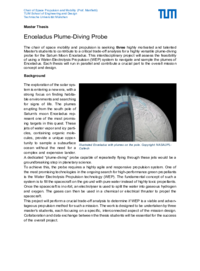Enceladus Plume-Diving Probe: Propulsion & Power Analysis
- Institut
- Lehrstuhl für Raumfahrtantriebe
- Typ
- Masterarbeit
- Inhalt
- theoretisch konstruktiv
- Beschreibung
The chair of space mobility and propulsion is seeking three highly motivated and talented Master's students to contribute to a critical trade-off analysis for a highly versatile plume-diving probe for the Saturn Moon Enceladus. This interdisciplinary project will assess the feasibility of using a Water-Electrolysis Propulsion (WEP) system to navigate and sample the plumes of Enceladus. Each thesis will run in parallel and contribute a crucial part to the overall mission concept and design.
Background
The exploration of the solar system is entering a new era, with a strong focus on finding habitable environments and searching for signs of life. The plumes erupting from the south pole of Saturn's moon Enceladus represent one of the most promising targets in this quest. These jets of water vapor and icy particles, containing organic molecules, provide a unique opportunity to sample a subsurface ocean without the need for a complex and expensive lander. A dedicated "plume-diving" probe capable of repeatedly flying through these jets would be a groundbreaking step in planetary science.
To achieve this, the probe requires a highly agile and responsive propulsion system. One of the most promising technologies in the ongoing search for high-performance green propellants is the Water Electrolysis Propulsion technology (WEP). The fundamental concept of such a system is to fill the spacecraft on the ground with pure water instead of highly toxic propellants. Once the spacecraft is in orbit, an electrolyser is used to split the water into gaseous hydrogen and oxygen. The gases can then be used in a chemical or electrical thruster to propel the spacecraft.
This project will perform a crucial trade-off analysis to determine if WEP is a viable and advantageous propulsion method for such a mission. The work is designed to be undertaken by three master's students, each focusing on a specific, interconnected aspect of the mission design. Collaboration and data exchange between the thesis students will be essential for the success of the overall project.
Thesis 1 of 3: Propulsion & Power Analysis
This thesis will focus on the technical feasibility and performance of the WEP system. The core task is to model the propulsion and power aspects of the probe and compare them with conventional propulsion options.
Tasks:
- Familiarization with the WEP and electrolyser technology
- Developing simple performance models for WEP and competing propulsion systems (e.g., steam/resistojet, green monopropellant). This includes modeling key parameters like specific impulse (Isp), thrust, and minimum impulse bit.
- Conducting a deep dive into WEP-specific challenges, such as electrolyzer efficiency, gas storage, and ignition constraints.
- Performing an end-to-end electrical energy analysis, calculating the power required for electrolysis and determining recharge times based on a 120 W RPS power baseline.
- Developing a preliminary thermal model to address heating needs for water and propellant lines and a rough radiator sizing.
- Output: Parametric tables of Δv vs. propellant mass, thrust profiles, and a comprehensive power/thermal budget. Documentation and presentation of the work
Contact
Fabian Riegelsberger, M.Sc.E-Mail: fabian.riegelsbergertum.de
- Voraussetzungen
- Introduction to Spaceflight
- Rocket Propulsion I
- Rocket Propulsion II Design Challenge OR Spacecraft Propulsion Design Challenge
- Möglicher Beginn
- sofort
- Kontakt
-
Fabian Riegelsberger, M.Sc.
Raum: Ottobrunn, Carolin-Herschelstr. 100 3.OG
fabian.riegelsbergertum.de - Ausschreibung
-
